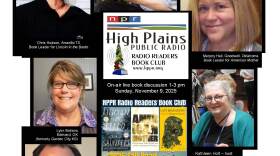I've been asked to say a few words about my book, "Elevations." It was published in 2018 by the University Press of Kansas and the subtitle is, "A Personal Exploration of the Ark River." That just about says it all.
I've always been suspicious of authors who can talk about their books, because it's a little like hearing a musician explain a song. The work stands on its own, and nothing I can say about it now will either help or hinder. Oh, I can talk for hours about the research that went into the book, how I began at the headwaters on the Continental Divide above Leadville, Colorado, and followed the river all the way across the Kansas plains to where Oklahoma begins. I can tell you that what started out as a straightforward research trip quickly became more personal, as I realized it is impossible to separate this kind of nonfiction book from the writer. I can tell that I discovered things about the wild and about myself, but I'm not comfortable saying exactly what out loud. I'm not sure I can talk about that among friends, even after a drink or two. Better to whisper these truths to readers across the page.
But I can tell you what the book is not.
It's not a travel book. Yes, I talk a lot about places along the river, but it's not a guidebook. There is some expectation with travel writing that you're presenting the best a place has to offer, that you're acting as kind of a booster, that you are sharing with others how to have most enjoyable vacation. But I know in many places "Elevations" is not fun reading. There's the chapter on the World War II Japanese-American internment camp at Granada, Colorado, for example. I also describe the dry bed of the Arkansas in western Kansas, and the conclusion that we have killed the river and it's not coming back anytime soon. But there is beauty in the book, or at least I hope the reader will find beauty in it, especially when I write about those places where we still haven't ruined the river, high in the mountains or here in Kansas, east of Great Bend. In the book, I purposely don't use metaphors for the river--especially time--because those are shopworn. I've also come to understand the river as a thing apart. It cannot be likened to other things because the river is wholly its own, defying categorization or comparison.
The water crisis was evident when the book was published and, three years later, it has only gotten worse. There's talk now of water wars in the west, hastened by irrigation and climate change. As I said in the book, much of the problem is the way we think about water. Too much of our law is based on the idea that water is a commodity to be exploited, a right to be held or transferred. Those old-fashioned ideas worked in the mid-twentieth century, but they ignore a basic human right, that we should all have access to clean and ample water, just as we need access to clean and ample air. Just saying that out loud is likely to start a fight in a place like Kansas, where property rights are treated like a religion. But we are pumping the aquifer beneath our feet dry, and we must soon change our relationship to water or lose it forever.
That's probably as much as I can stand to talk about my own work. Thanks for listening, and keep reading -- not my book, necessarily, but everything you can get your hands on. Good luck.
You’ve been listening to Max McCoy, author of Elevations, A Personal Exploration of the Arkansas River. The book launches the 2021 Fall Read of HPPR’s Radio Readers Book Club with the theme Rivers - Meandering Meaning.
The Radio Readers Book Club is an on-air, on-line community of readers exploring themes of interest to those who live and work on the High Plains. You’ll find more by clicking the Book Club under the Features Menu at hppr.org.
The series is funded in part by generous gifts from Lon Frahm of Colby, Lynne Hewes of Cimarron and Lynn Boitano, formerly of Garden City Kansas.









